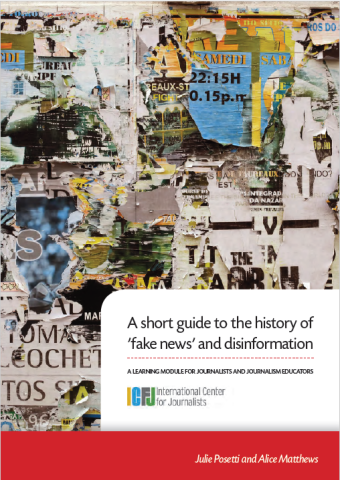
Spanish version available here.
‘Fake news’ is not new. In fact, the recorded history of ‘disinformation wars’ dates back to ancient Rome. But the 21st century has seen the weaponization of information on an unprecedented scale. Powerful new technology makes the manipulation and fabrication of content simple, and social networks dramatically amplify falsehoods peddled by anti-democratic governments, populist politicians and dishonest corporate entities.
We now inhabit a world where malicious actors and state propagandists can use ‘computational propaganda,’ ‘sock-puppet networks,’ ‘troll armies,’ and technology that can mimic legitimate news websites and seamlessly manipulate audio and video to impersonate legitimate sources. Then, there are the profiteers making a living from creating fraudulent content for viral distribution on social platforms. Combined, these developments present an unprecedented threat level that sees journalists and their work turned into targets.
The emerging ‘information arms race’ is a big story. But it is important to understand the historical context when examining and reporting on contemporary manifestations of the 21st century phenomenon of ‘information disorder.’
A new resource published by the International Center for Journalists (ICFJ) – A short guide to the history of 'fake news' and disinformation – plots the evolution of the current crisis on an international timeline, highlighting historic moments stretching from Cleopatra to Cambridge Analytica. We encourage anyone who uses the learning module to augment this timeline with examples from their own country’s history, adding new entries as the crisis – and defensive responses to it – evolve.
The guide also includes examples of good practice, suggested exercises, readings and assignments to help deepen understanding and aid nuanced reporting on ‘fake news.’ It is designed as a learning module for journalists, journalism trainers and educators, and it is intended for use in news organizations, media development courses, and journalism schools. We hope it will also be a valuable resource for teachers of media literacy and communications researchers – as well as an informative read for anyone interested in the evolution of the disinformation crisis now threatening open societies around the world.
The guide is free to download and use under Creative Commons Attribution-ShareAlike 4.0 International (CC BY-SA 4.0).
About the authors
Julie Posetti is Senior Research Fellow at the Reuters Institute for the Study of Journalism at the University of Oxford, where she leads the Journalism Innovation Project. She is author of Protecting Journalism Sources in the Digital Age and co-editor of the forthcoming UNESCO handbook: Journalism, ‘Fake News’ and Disinformation. You can follow her on Twitter @JuliePosetti.
Alice Matthews is a news and current affairs journalist at the Australian Broadcasting Corporation (ABC) in Sydney. Follow her on Twitter at @AlicekMatthews.